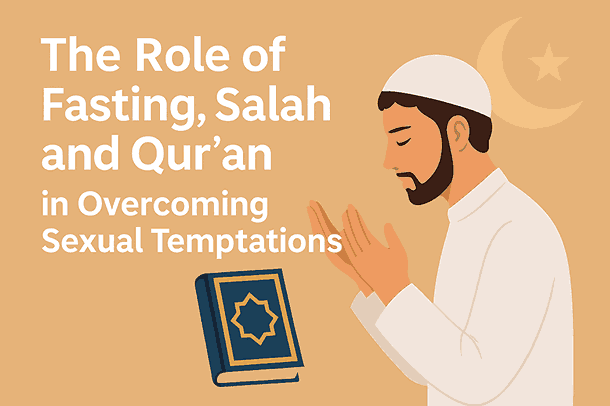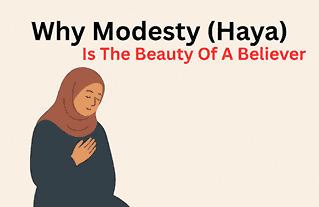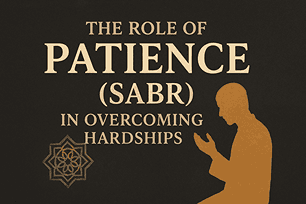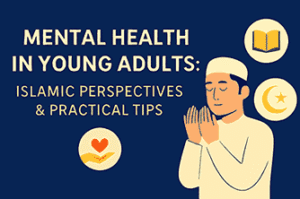The Role of Fasting, Salah, and Qur’an in Overcoming Sexual Temptations

In today’s hypersexualized world, young Muslims are increasingly exposed to suggestive content through social media, entertainment, and peer culture. This constant exposure fuels lustful desires, which if left unchecked, can lead to sinful actions such as illicit relationships, addiction to pornography, or even spiritual burnout. Islam acknowledges that sexual temptations are natural and part of human creation. However, Islam also provides powerful spiritual mechanisms to regulate these desires rather than suppress them unnaturally.
Among the most effective of these mechanisms are Sawm (Fasting), Salah (Prayer), and the guidance of the Qur’an. These three are not only acts of worship but also serve as divine shields, training the heart, mind, and body to resist temptations. This article explores how these spiritual tools can practically help Muslim youth overcome sexual temptations.
1. Fasting (Sawm): Disciplining the Body and Desires
Sawm is more than simply abstaining from food and drink during the day; it is a holistic exercise in self-restraint. When a believer fasts, they intentionally deny themselves lawful pleasures to strengthen their willpower. This spiritual discipline helps weaken the influence of unlawful desires, especially sexual ones.
The Prophet ﷺ said: “O young men, whoever among you can afford to marry, let him marry; and whoever cannot, then he should fast, for it will be a shield for him.” (Sahih al-Bukhari, Sahih Muslim)
This hadith directly links fasting with protection from sexual urges. By reducing physical energy and hormonal stimulation, fasting lowers the intensity of lust and creates mental clarity. Moreover, fasting increases taqwa (God-consciousness), which restrains a person from approaching sin even when the opportunity arises.
Practical application: Young Muslims who are not yet married can adopt voluntary fasting (e.g., Mondays and Thursdays, or the white days — 13th, 14th, and 15th of every lunar month). Over time, this builds emotional resilience and gives the individual a sense of control over their impulses, which is crucial in resisting sexual temptations.
2. Salah (Prayer): Nurturing Spiritual Awareness and Accountability
Salah is the cornerstone of Islamic practice and a daily reminder of one’s purpose. It is a direct connection between the servant and Allah, which renews faith and spiritual energy five times a day. Salah acts as a barrier against immoral behavior because it keeps the heart alive and mindful of Allah’s presence.
Allah ﷻ says: “Indeed, prayer prohibits immorality and wrongdoing.” (Qur’an 29:45)
When performed consistently and sincerely, Salah purifies the heart from spiritual diseases like lust and arrogance. Each prayer realigns a person’s focus from worldly temptations back to their ultimate purpose — worshipping Allah. It instills a sense of haya (modesty and shame), which makes a believer reluctant to disobey Allah.
Psychological impact: Salah trains self-discipline by scheduling the day around worship. This structure reduces idle time — a common trigger for lustful thoughts or behaviors. Furthermore, the spiritual calm gained from prayer can heal anxiety or loneliness, which often underlie sexual temptations.
Practical tip: Youth should focus on improving the quality of their prayers (khushu‘ and tadabbur), not just quantity. Praying on time, with concentration, and reflecting on the meanings of Qur’anic verses recited in Salah can deeply strengthen the heart against sinful desires.
3. The Qur’an: Reprogramming the Mind with Divine Wisdom
The Qur’an is the ultimate guide for the believer’s heart and mind. While Salah and fasting discipline the body and emotions, the Qur’an nourishes the intellect and reshapes one’s worldview. Sexual temptations often stem from distorted thinking — such as equating physical pleasure with happiness or believing that self-worth depends on being desired. The Qur’an corrects these illusions by offering divine truth.
It reminds believers of the fleeting nature of worldly pleasures and the eternal rewards of self-restraint.
It recounts stories of prophets who upheld chastity in the face of strong temptation, such as Prophet Yusuf عليه السلام, who rejected the advances of a powerful woman out of fear of Allah (Qur’an 12:23–24).
It promotes purity of heart, lowering the gaze, and seeking lawful avenues (marriage) rather than illicit gratification.
Regular recitation (tilawah) and contemplation (tadabbur) of the Qur’an plant spiritual strength in the heart. The verses act like light, gradually pushing out the darkness of lustful thoughts.
Practical tip: Youth can develop a daily Qur’an routine, even if short, and focus on verses about self-restraint, the Hereafter, and the rewards for those who guard their chastity.
4. Integrating These Practices for Lasting Change
Each of these acts — fasting, Salah, and Qur’an — works best when combined. Fasting weakens the body’s urges, Salah strengthens the heart’s resistance, and Qur’an enlightens the mind with purpose. Together, they form a holistic strategy for overcoming sexual temptations.
Other supportive steps include:
Surrounding oneself with pious friends and Islamic environments.
Avoiding triggers (like inappropriate media) and using content filters on devices.
Engaging in productive hobbies, exercise, or volunteering to reduce idle time.
Making sincere dua (supplication) asking Allah to purify the heart and grant lawful marriage.
Conclusion
Sexual temptations are among the greatest challenges of youth, but Islam equips believers with powerful spiritual tools to control them. Through fasting, a Muslim disciplines the body; through Salah, they strengthen the heart; and through the Qur’an, they enlighten the mind. When consistently practiced with sincerity, these acts build spiritual immunity, helping youth stay firm on the straight path and maintain purity until marriage.
True strength lies not in suppressing desires forcefully but in mastering them through faith, discipline, and the remembrance of Allah.













1 comment